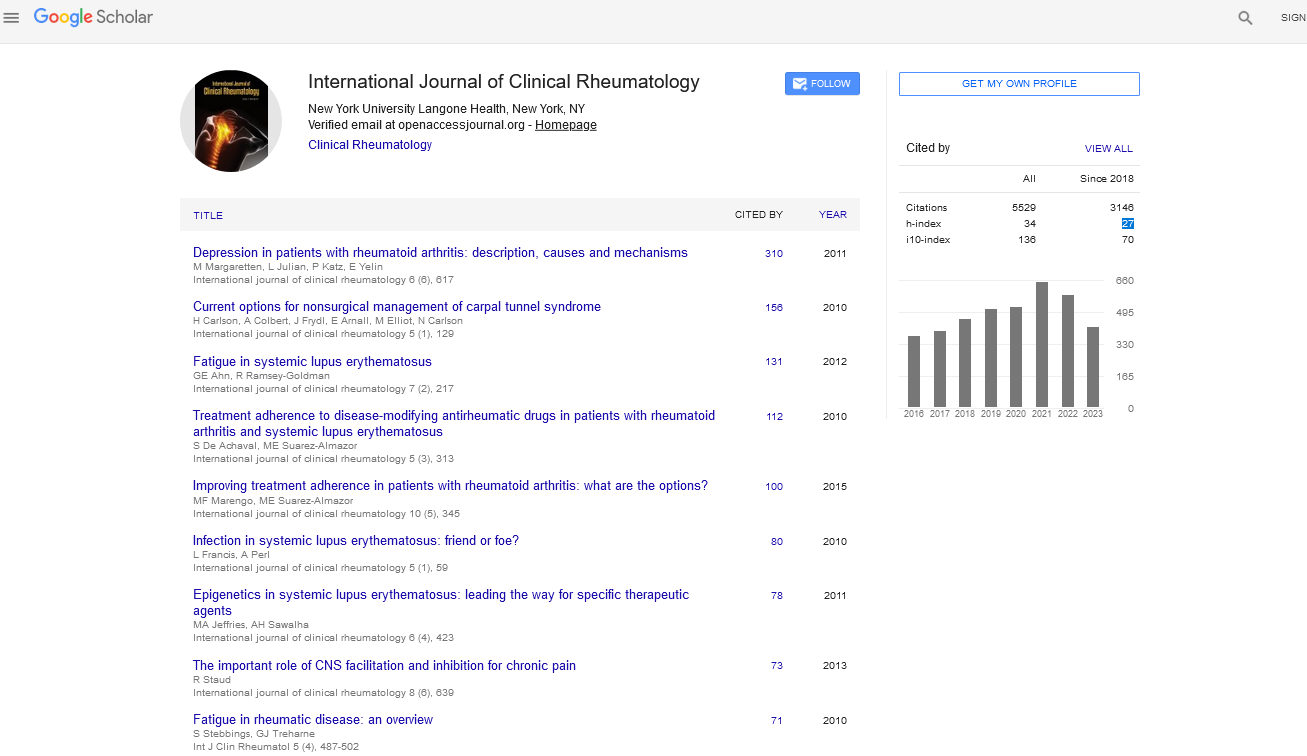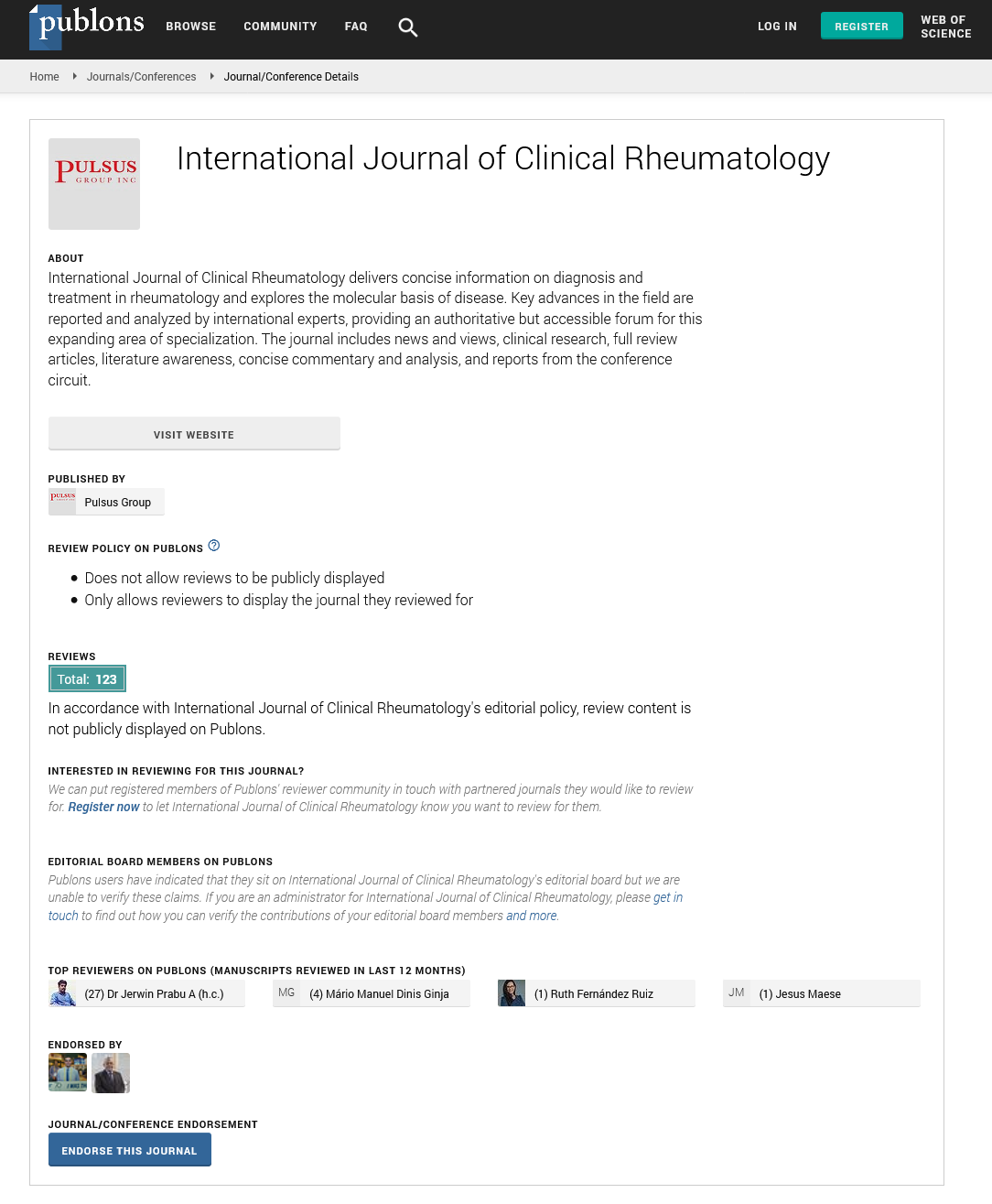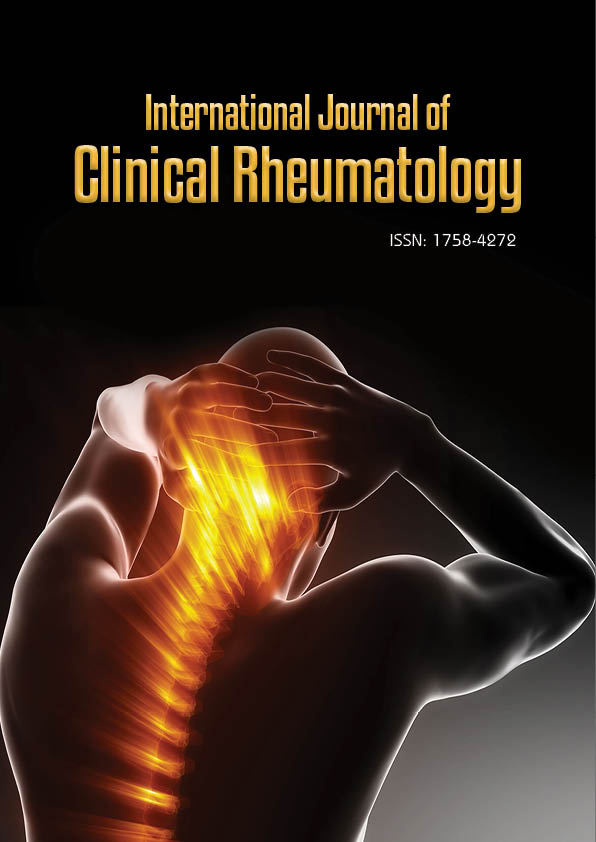Editorial - International Journal of Clinical Rheumatology (2024) Volume 19, Issue 10
The Role of Gut Microbiota in the Pathogenesis of Inflammatory Rheumatic Diseases: Implications for Therapy
Robin Christensen *
Department of Pediatrics and School of Rehabilitation Sciences, University of Ottawa, Canada
- *Corresponding Author:
- Robin Christensen
Department of Pediatrics and School of Rehabilitation Sciences, University of Ottawa, Canada
E-mail: Christensen@rb.com
Received: 02-Oct-2024, Manuscript No. fmijcr-25-157356; Editor ssigned: 04-Oct-2024, Pre-QC No. fmijcr-25-157356 (PQ); Reviewed: 17-Oct-2024, QC No. fmijcr-25-157356; Revised: 23- Oct-2024, Manuscript No. fmijcr-25-157356 (R); Published: 30- Oct-2024, DOI: 10.37532/1758-4272.2024.19(9). 275-278
Abstract
Recent studies have revealed an intricate link between gut microbiota and inflammatory rheumatic diseases (IRD), such as rheumatoid arthritis (RA), systemic lupus erythematosus (SLE), and ankylosing spondylitis (AS). Gut dysbiosis, characterized by an imbalance in the microbial community, is increasingly recognized as a contributing factor to the pathogenesis of these diseases. Inflammatory rheumatic diseases are associated with altered gut microbiota composition, which may influence systemic inflammation, immune regulation, and disease progression. This review explores the role of gut microbiota in the pathogenesis of IRD, highlighting the mechanisms through which microbial imbalances may contribute to disease onset and flares. Additionally, the potential therapeutic implications of modulating the gut microbiome through diet, probiotics, prebiotics, and fecal microbiota transplantation are discussed. Understanding the complex interaction between the gut microbiota and host immunity may open novel avenues for the treatment and prevention of IRD.
Keywords
Gut microbiotaâ Inflammatory rheumatic diseasesâ Rheumatoid arthritisâ Systemic lupus erythematosusâ Ankylosing spondylitisâ Dysbiosisâ Immune modulationâ Therapy
Introduction
Inflammatory rheumatic diseases (IRD) encompass a range of autoimmune disorders characterized by chronic inflammation affecting joints, tissues, and other organs. Rheumatoid arthritis (RA), systemic lupus erythematosus (SLE), ankylosing spondylitis (AS), and other related conditions significantly impact quality of life and pose major health burdens worldwide. Despite advances in pharmacological treatments, the underlying causes of these diseases remain incompletely understood. Increasing evidence suggests that the gut microbiota, the diverse community of microorganisms residing in the human gastrointestinal tract, plays a pivotal role in both the development and progression of these diseases [1,2].
The gut microbiota not only influences local digestive processes but also plays a crucial role in modulating systemic immune responses. Dysbiosis, or microbial imbalance, has been observed in individuals with IRDs, suggesting a possible link between the gut microbiome and disease pathogenesis. This review aims to explore the emerging role of gut microbiota in IRD, examine the mechanisms by which microbial communities influence disease outcomes, and evaluate therapeutic strategies aimed at restoring microbiota balance [3,4].
Gut Microbiota and Immune System Interaction
The gut is home to trillions of microorganisms, including bacteria, viruses, fungi, and archaea, which together form a complex ecosystem. These microbes engage in a dynamic interaction with the host immune system, shaping immune tolerance and inflammation. The gut-associated lymphoid tissue (GALT) is a critical component of the immune system, where immune cells interact with gut microbiota to maintain immune homeostasis.
Several mechanisms illustrate how gut microbiota can influence systemic immunity:
Regulation of T-cell responses: The gut microbiota plays a key role in the differentiation of regulatory T cells (Tregs) and Th17 cells, both of which are involved in immune regulation. An imbalance in Treg/Th17 responses has been implicated in the pathogenesis of autoimmune diseases.
Activation of innate immunity: Microbial components, such as lipopolysaccharides (LPS), can activate pattern recognition receptors (PRRs) like Toll-like receptors (TLRs) on immune cells, leading to the release of pro-inflammatory cytokines. Dysregulation of these pathways can contribute to systemic inflammation and autoimmunity.
Influence on gut barrier function: The intestinal epithelium acts as a barrier that prevents harmful pathogens and immune responses from entering the bloodstream. An altered microbiome may impair the intestinal barrier, resulting in "leaky gut" and the translocation of microbial products into circulation, further exacerbating immune activation [5].
Gut Dysbiosis and Its Association with Inflammatory Rheumatic Diseases
Emerging research has demonstrated that individuals with IRDs exhibit distinct changes in gut microbiota composition, known as dysbiosis. In particular, studies have found:
Rheumatoid arthritis (RA): In patients with RA, a reduction in beneficial bacteria such as Firmicutes and an increase in pro-inflammatory taxa such as Proteobacteria have been observed. These changes are thought to contribute to the increased production of autoantibodies, such as rheumatoid factor (RF) and anti-citrullinated protein antibodies (ACPA), which are hallmarks of RA. Moreover, microbiota-derived metabolites, such as short-chain fatty acids (SCFAs), play an essential role in regulating immune responses, and their alteration in RA could affect disease pathogenesis [6].
Systemic lupus erythematosus (SLE): Dysbiosis in SLE patients is characterized by an overrepresentation of Prevotella species and a depletion of Bacteroides and Firmicutes. These imbalances can affect the immune system by altering the activity of immune cells, particularly dendritic cells, which are involved in antigen presentation and the initiation of autoimmune responses. The imbalance in gut microbiota may also lead to the production of autoantibodies, a key feature of SLE [7].
Ankylosing spondylitis (AS): In AS, the gut microbiota has been implicated in the inflammatory response through its interaction with the innate immune system. Studies have found an overrepresentation of Enterococcus and Bacteroides species in AS patients, suggesting a potential role for these microorganisms in driving inflammation via the activation of the NLRP3 inflammasome and other immune pathways.
Psoriatic arthritis and other IRDs: Alterations in gut microbiota have also been observed in conditions like psoriatic arthritis, with reduced microbial diversity and an overgrowth of pro-inflammatory species. These findings suggest that microbiota-driven immune activation may play a central role in the pathogenesis of various IRDs.
Mechanisms Linking Gut Microbiota to Inflammatory Rheumatic Diseases
Several mechanisms have been proposed to explain the contribution of gut microbiota to the development and exacerbation of IRDs:
Molecular mimicry: Certain gut microbes share molecular structures with host tissues, leading to an immune response that targets both the microbe and the host. In the case of RA, microbial antigens may mimic citrullinated peptides found in joints, triggering the production of ACPA and contributing to joint inflammation.
Inflammatory pathways: Dysbiosis may promote inflammation by increasing the production of microbial-derived metabolites, such as LPS, which activate immune cells and stimulate the release of pro-inflammatory cytokines (e.g., TNF-α, IL-6). These cytokines can contribute to the chronic inflammation observed in IRDs.
Gut barrier dysfunction: Dysbiosis has been linked to disruption of the intestinal epithelial barrier, leading to "leaky gut." The leakage of bacterial components into the bloodstream can activate systemic immune responses and contribute to the pathogenesis of autoimmune diseases, including RA and SLE [8].
Toll-Like Receptor (TLR) Activation: Alterations in gut microbiota composition may result in the increased activation of TLRs on immune cells, which can lead to the production of inflammatory mediators that exacerbate disease.
Therapeutic Implications of Gut Microbiota Modulation
Given the emerging role of gut microbiota in the pathogenesis of IRDs, there is growing interest in targeting the microbiome as a therapeutic strategy. Several approaches have shown promise in preclinical and clinical studies:
Probiotics: The use of specific probiotic strains has been explored as a means to restore gut microbiota balance. Some studies have demonstrated that probiotics can reduce systemic inflammation and improve disease outcomes in RA and SLE, although results are still preliminary.
Prebiotics: Prebiotics, which are non-digestible fibers that promote the growth of beneficial microbes, may help restore a healthy gut microbiota composition. In RA, prebiotic supplementation has shown some potential in modulating immune responses and reducing inflammatory markers.
Dietary modifications: Diet plays a crucial role in shaping the gut microbiome. A diet rich in fiber, fruits, and vegetables may promote the growth of beneficial bacteria and reduce inflammation. Conversely, a diet high in saturated fats and processed foods may promote dysbiosis and contribute to disease progression [9].
Fecal microbiota transplantation (FMT): FMT involves the transfer of fecal material from a healthy donor to a patient with dysbiosis, with the aim of restoring a balanced microbiome. Though still in the early stages of research, FMT has shown promise in conditions like Clostridium difficile infection and is being explored for its potential in autoimmune diseases.
Small molecule modulators: Researchers are investigating small molecules that can selectively target the gut microbiota to restore homeostasis. These molecules could potentially modulate specific microbial populations or their metabolites to reduce inflammation in IRDs [10].
Conclusion
The gut microbiota plays a significant role in the pathogenesis of inflammatory rheumatic diseases by influencing immune responses, inflammation, and tissue damage. Dysbiosis is increasingly recognized as a contributing factor in diseases like rheumatoid arthritis, systemic lupus erythematosus, and ankylosing spondylitis. While the precise mechanisms remain an area of active research, the potential for microbiome-based therapies offers a novel and exciting avenue for treating these chronic and debilitating conditions. Future studies should aim to elucidate the causal relationships between gut microbiota and IRD, optimize therapeutic interventions, and explore personalized approaches for modulating the microbiome in clinical settings.


